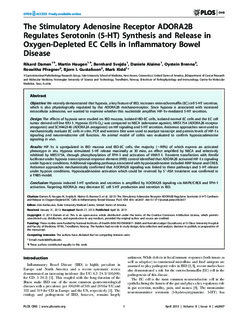The Stimulatory Adenosine Receptor ADORA2B Regulates Serotonin (5-HT) Synthesis and Release in Oxygen-Depleted EC Cells in Inflammatory Bowel Disease
Damen, Rikard; Haugen, Martin; Svejda, Bernhard; Alaimo, Daniele; Brenna, Øystein; Pfragner, Roswitha; Gustafsson, Björn; Kidd, Mark
Journal article, Peer reviewed
Permanent lenke
http://hdl.handle.net/11250/2367346Utgivelsesdato
2013Metadata
Vis full innførselSamlinger
Sammendrag
Objective:
We recently demonstrated that hypoxia, a key feature of IBD, increases enterochromaffin (EC) cell 5-HT secretion, which is also physiologically regulated by the ADORA2B mechanoreceptor. Since hypoxia is associated with increased extracellular adenosine, we wanted to examine whether this nucleotide amplifies HIF-1α-mediated 5-HT secretion.
Design:
The effects of hypoxia were studied on IBD mucosa, isolated IBD-EC cells, isolated normal EC cells and the EC cell tumor derived cell line KRJ-1. Hypoxia (0.5% O2) was compared to NECA (adenosine agonist), MRS1754 (ADORA2B receptor antagonist) and SCH442146 (ADORA2A antagonist) on HIF signaling and 5-HT secretion. Antisense approaches were used to mechanistically evaluate EC cells in vitro. PCR and western blot were used to analyze transcript and protein levels of HIF-1α signaling and neuroendocrine cell function. An animal model of colitis was evaluated to confirm hypoxia:adenosine signaling in vivo.
Results:
HIF-1α is upregulated in IBD mucosa and IBD-EC cells, the majority (∼90%) of which express an activated phenotype in situ. Hypoxia stimulated 5-HT release maximally at 30 mins, an effect amplified by NECA and selectively inhibited by MRS1754, through phosphorylation of TPH-1 and activation of VMAT-1. Transient transfection with Renilla luciferase under hypoxia transcriptional response element (HRE) control identified that ADORA2B activated HIF-1α signaling under hypoxic conditions. Additional signaling pathways associated with hypoxia:adenosine included MAP kinase and CREB. Antisense approaches mechanistically confirmed that ADORA2B signaling was linked to these pathways and 5-HT release under hypoxic conditions. Hypoxia:adenosine activation which could be reversed by 5′-ASA treatment was confirmed in a TNBS-model.
Conclusion:
Hypoxia induced 5-HT synthesis and secretion is amplified by ADORA2B signaling via MAPK/CREB and TPH-1 activation. Targeting ADORA2s may decrease EC cell 5-HT production and secretion in IBD.
